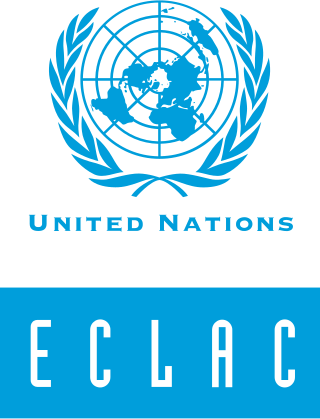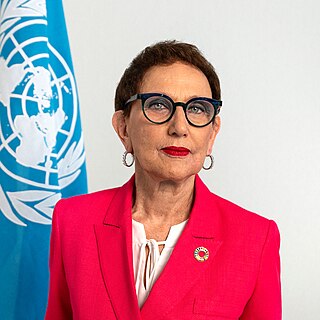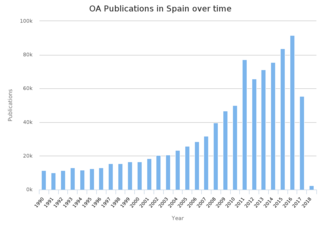
Enrique Valentín Iglesias García is a Spanish-Uruguayan economist. He served as the first president of the Central Bank of Uruguay from 1967 to 1969. He has also served as President of the Inter-American Development Bank from 1988 to 2005, an international institution dedicated to furthering economic development in the Western Hemisphere through investment and policy formulation. He was appointed as Special Adviser for Venezuela to Federica Mogherini, the European Union's High Representative for Foreign Affairs and Security Policy and Vice-President of the European Commission, on 28 May 2019.

The United Nations Economic Commission for Latin America and the Caribbean is a United Nations regional commission to encourage economic cooperation. ECLAC includes 46 member States, and 14 associate members which are various non-independent territories, associated island countries and a commonwealth in the Caribbean. ECLAC publishes statistics covering the countries of the region and makes cooperative agreements with nonprofit institutions. The headquarters of ECLAC is in Santiago, Chile.

The Buenos Aires Stock Exchange is the organization responsible for the operation of Argentina's primary stock exchange located at Buenos Aires central business district. Founded in 1854, it is the successor to the Banco Mercantil, which was created in 1822 by Bernardino Rivadavia.
Armando Di Filippo is an Argentine economist, an economic science faculty member at the University of Rosario and Magíster in economic science at the University of Chile.

The Bolivarian missions are a series of over thirty social programs implemented under the administration of former Venezuelan president Hugo Chávez and continued by Chávez's successor, Nicolás Maduro. The programs focus on helping the most disadvantaged social sectors and guaranteeing essential rights such as health, education and food. The created missions created include Mission Robinson (literacy), Mission Barrio Adentro, and Mission Mercal.

Alicia Isabel Adriana Bárcena Ibarra is a Mexican biologist and the current Secretary of Environment and Natural Resources of Mexico. She was the Secretary of Foreign Affairs from 2023 to 2024 and previously served as the Executive Secretary of the United Nations Economic Commission for Latin America and the Caribbean (ECLAC) from July 2008 to March 2022.

Pedro Vuskovic Bravo was a Chilean economist of Croatian descent, political figure, minister and author of the economic plan implemented by Salvador Allende during his government called the Vuskovic plan. His economic policies were used by economists Rudi Dornbusch and Sebastian Edwards to coin the term macroeconomic populism.

Gert Rosenthal Königsberger is a Guatemalan diplomat who served as Guatemala's Minister of Foreign Affairs from 25 July 2006 to 14 January 2008 under the government of Óscar Berger.

Rebeca Grynspan Mayufis is a Costa Rican economist who has been serving as Secretary-General of the UN Trade and Development (UNCTAD) since 13 September 2021.

CAF - Development Bank of Latin America and the Caribbean, formerly the Andean Development Corporation, is a Caracas based development bank whose mission is to promote sustainable development and regional integration in Latin America and the Caribbean, through the financing of projects of the public and private sectors, the provision of technical cooperation and other specialized services.
North America was one of the focal points of the global Great Recession. While Canada has managed to return its economy nearly to the levels it enjoyed prior to the recession, the United States and Mexico are still under the influence of the worldwide economic slowdown. The cost of staple items dropped dramatically in the United States as a result of the recession.
eLAC in international relations, is an intergovernmental strategy that conceives of information and communications technologies (ICTs) as instruments for economic development and social inclusion in Latin America and the Caribbean. It is based on a public-private sector partnership and is part of a long-term vision in line with the Millennium Development Goals (MDGs), those of the World Summit on the Information Society (WSIS), and now, the Sustainable Development Goals (SDGs). It contributes to the implementation of these long-term goals by pursuing a consecutive series of frequently adjusted short-term action plans with concrete qualitative and quantitative goals to be achieved.
José Antonio Mayobre was a Venezuelan economist who worked as an academic economist, a diplomat and international civil servant. He was a Minister of Finance of Venezuela and the Executive Secretary of the ECLAC.

The Forum for East Asia-Latin America Cooperation or is a regional forum of 36 countries constituting the region of East, Southeast Asia, Oceania, and Latin America that came together to form an official and regular dialogue channel between the two regions.

Ricardo Ffrench-Davis is a Chilean economist. He is Professor of the Department of Economics and the Instituto de Estudios Internacionales at the University of Chile. Along with a few other Chilean students, Ffrench-Davis got the chance to study at the University of Chicago in the 1960s. He earned his Ph.D. in Economics from the University of Chicago in 1971, where his dissertation was supervised by Larry Sjaastad. Although the students were later named Chicago Boys, Professor Ffrench-Davis was a critic of the neo-liberal policies implemented in Chile by the Pinochet dictatorship.

Hernán Santa Cruz was a Chilean lawyer and diplomat, Chile's first delegate to the United Nations and one of the nine original drafters of the Universal Declaration of Human Rights.

Juan Alberto Fuentes Knight is a Guatemalan economist, politician, and non-profit official. Among other roles, he has served as Minister of Finance in Guatemala and as chairman of Oxfam International.

In Spain, the national 2011 "Ley de la Ciencia, la Tecnología y la Innovación" requires open access publishing for research that has been produced with public funding. The first peer-reviewed open access Spanish journal, Relieve, began in 1995. Publishers CSIC Press and Hipatia Press belong to the international Open Access Scholarly Publishers Association.

The Latin American Council of Social Sciences (CLACSO) is an national non-governmental institution, created in 1967 from an initiative of UNESCO, an institution in which it has Associative status. Currently, it brings together 680 research centers and postgraduate programs in various fields of the social sciences and humanities, located in 51 countries in Latin America and the Caribbean, as well as in the United States, Africa and Europe. Its headquarters are in Buenos Aires, Argentina. The current executive secretary of the organization is Karina Batthyány.

The Regional Agreement on Access to Information, Public Participation and Justice in Environmental Matters in Latin America and the Caribbean, better known as the Escazú Agreement, is an international treaty signed by 25 Latin American and Caribbean nations concerning the rights of access to information about the environment, public participation in environmental decision-making, environmental justice, and a healthy and sustainable environment for current and future generations. The agreement is open to 33 countries in Latin America and the Caribbean. Of the 25 signatories, it has been ratified by 17: Antigua and Barbuda, Argentina, Belize, Bolivia, Chile, Colombia, Dominica, Ecuador, Grenada, Guyana, Mexico, Nicaragua, Panama, Saint Vincent and the Grenadines, Saint Kitts and Nevis, Saint Lucia, and Uruguay.




















